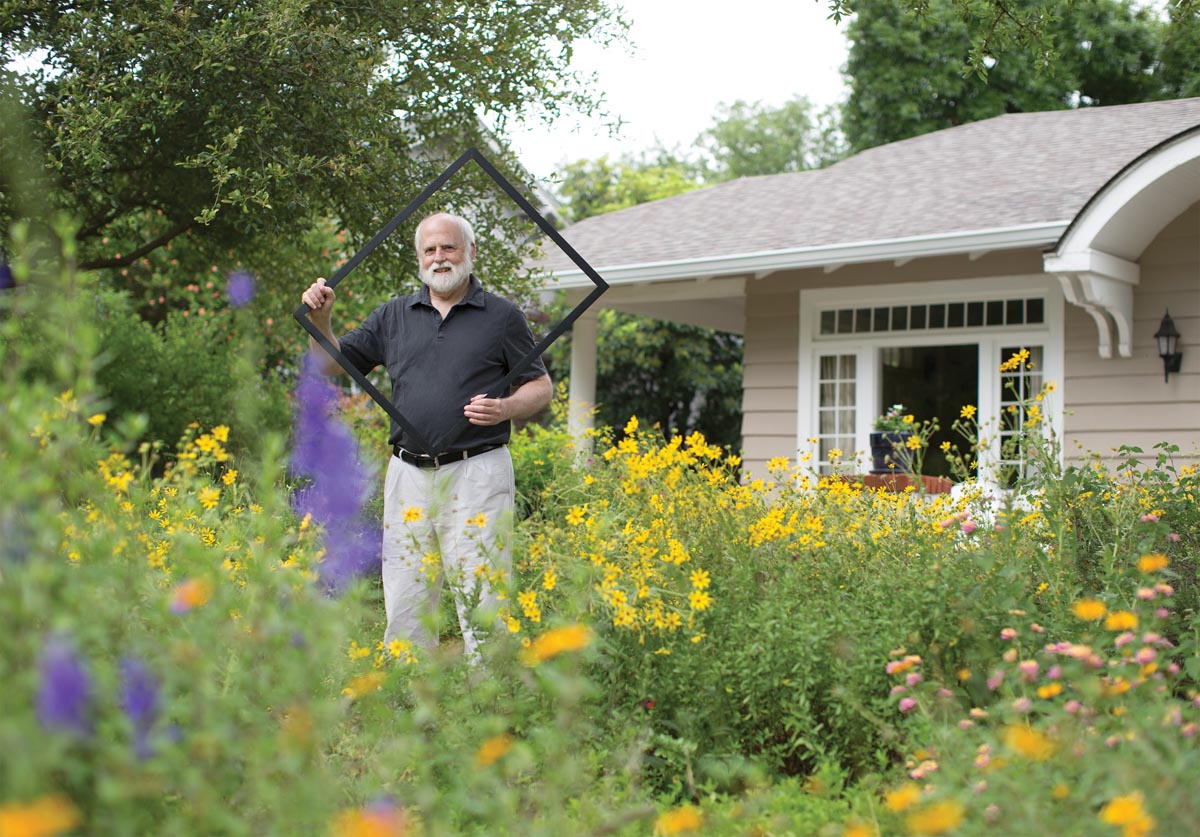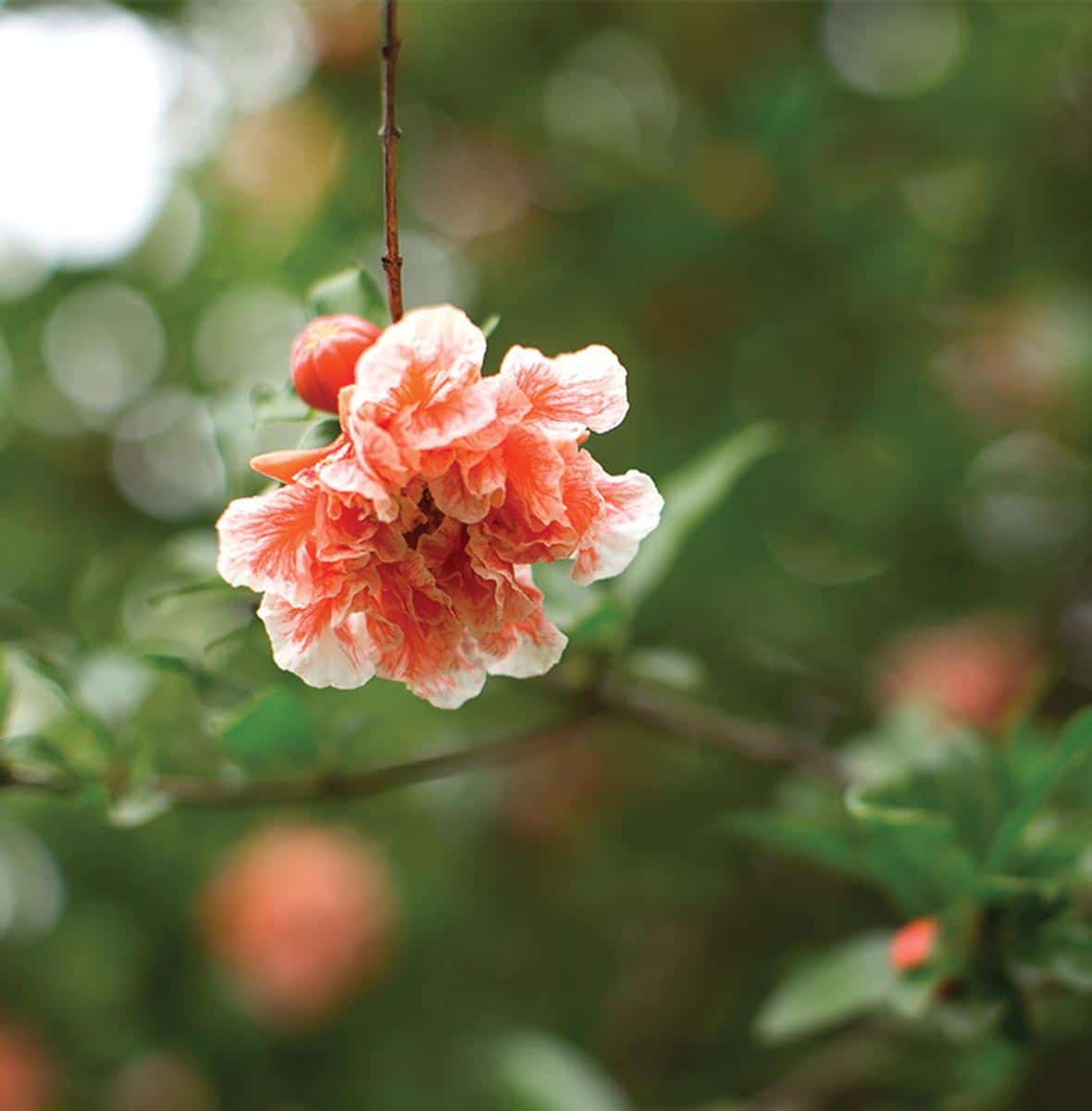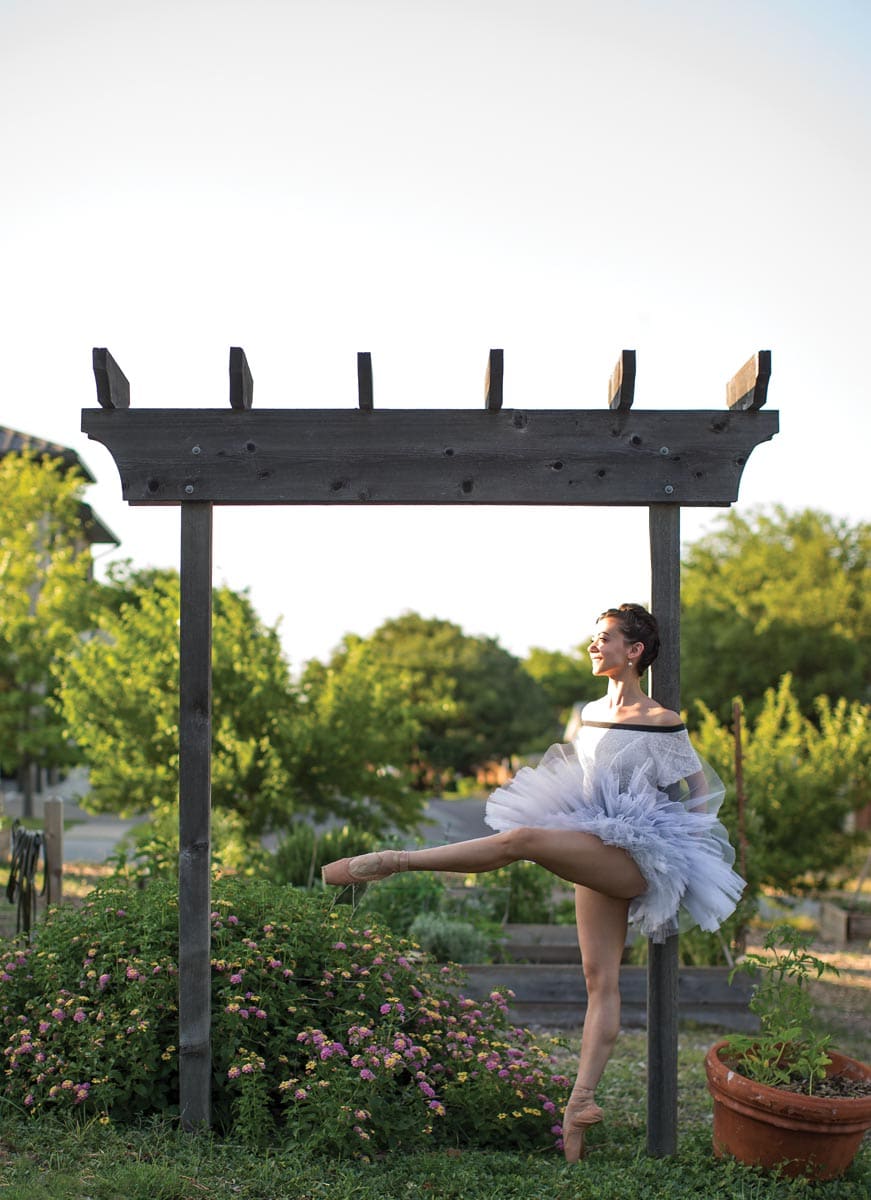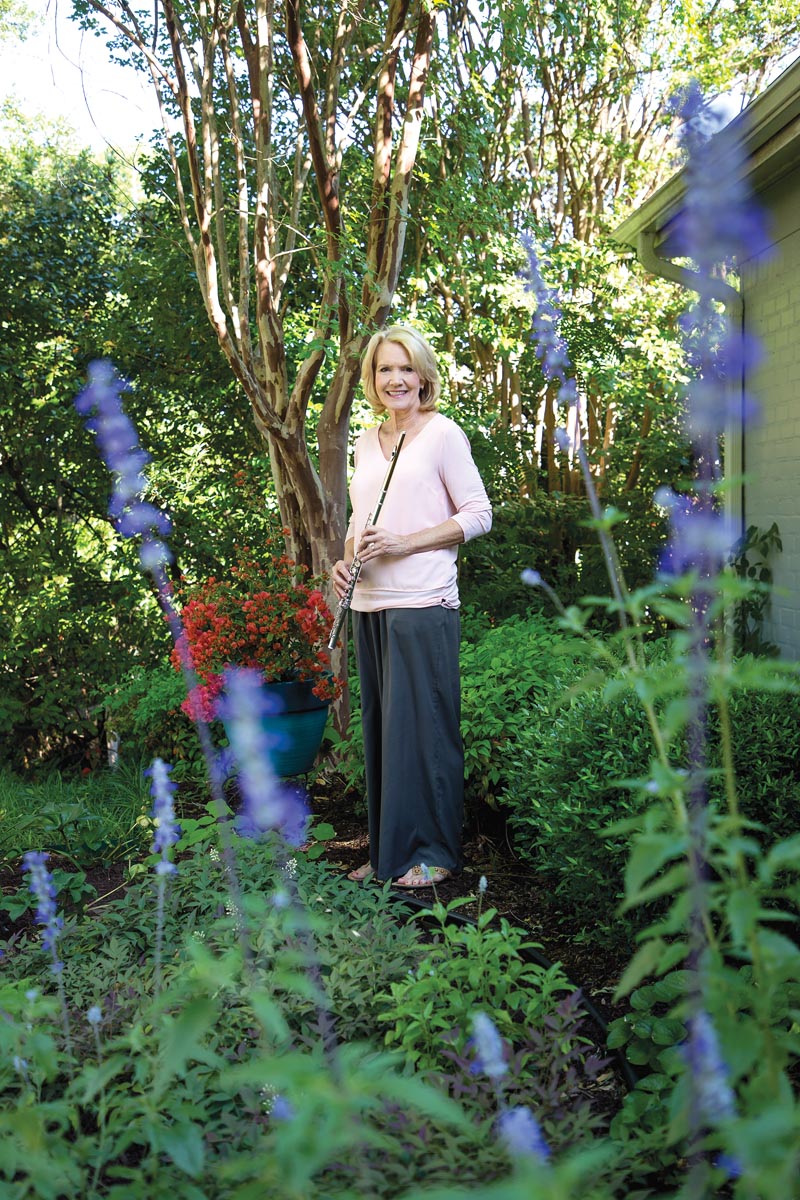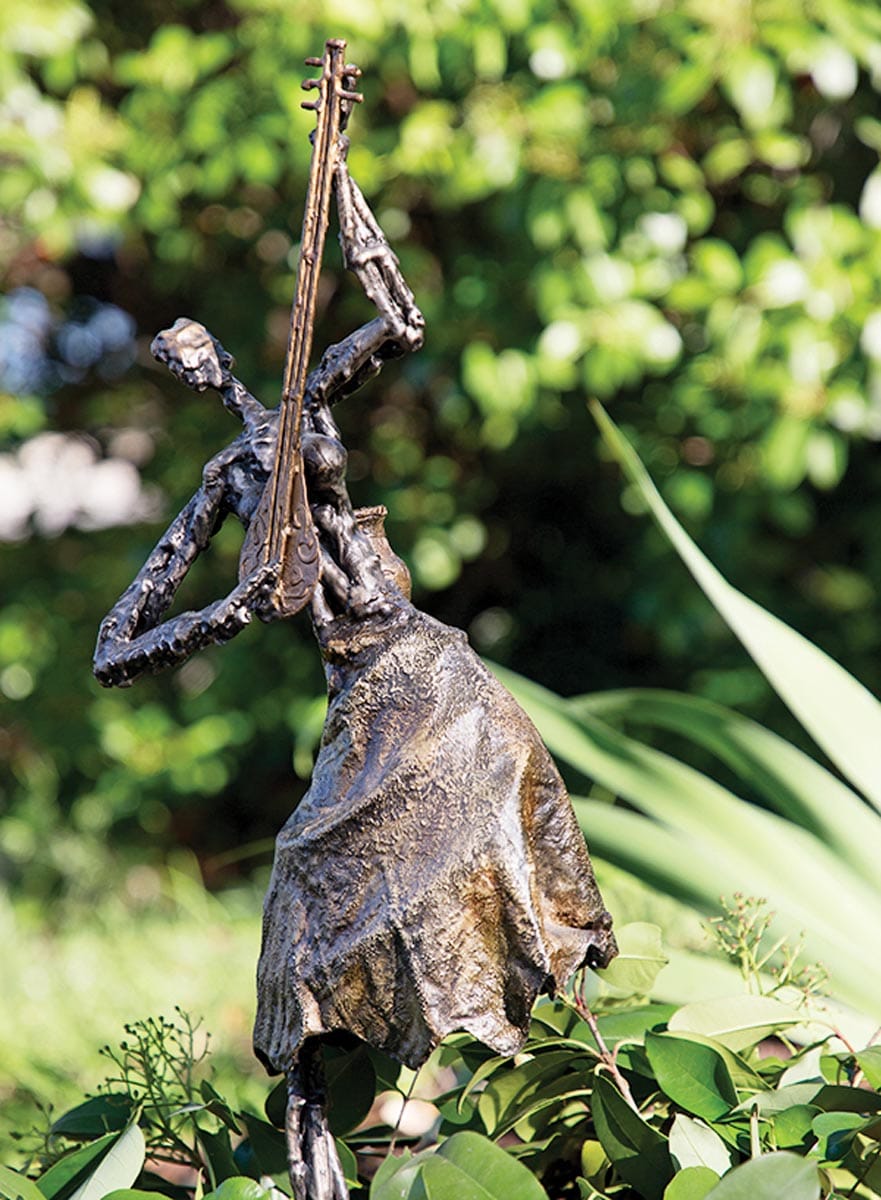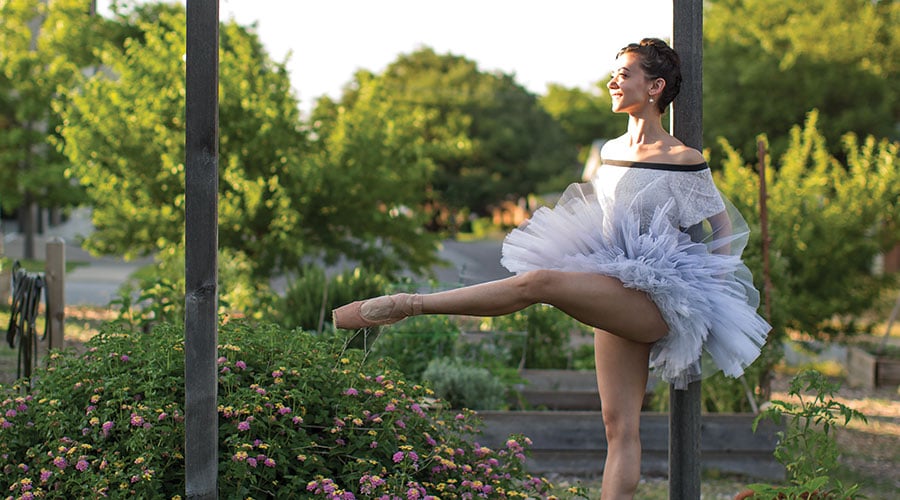
Garden Art
Photos by Ron Jenkins
Two months into staying at home, we can better appreciate that gardeners have been onto something all along. There’s the color and beauty they so capably conjure, the mood-enhancing experience of digging in the dirt, the satisfaction of producing food and flowers and the emboldening step toward self-sufficiency. From lifelong gardeners to newly minted ones, we caught up with four figures from the arts world who have found joy and comfort as urban farmers while sheltering in place. — Laura Samuel Meyn
John Rohrbach
SENIOR CURATOR OF PHOTOGRAPHS, AMON CARTER MUSEUM OF AMERICAN ART
John Rohrbach loves color, and it shows. His Texas perennial front yard — filled with salvia, larkspur, cutleaf daisy and much more — blooms from March into December. Rohrbach and his wife kept a traditional lawn and vegetable garden when they lived in New England, but their move to Texas delivered a very different climate. One fall, after a decade of watering and mowing the front lawn of the 1920s Fort Worth home, Rohrbach says he took the “lazy man’s approach” and covered the grass with newspaper, had a truckload of dirt dumped over it, and read up on native plants; that spring, he installed a variety of water-wise Texas perennials. “It was to save money and to be sensitive to the fact that we live in a very hot, dry climate,” he says. Rohrbach admits that not everyone loves the look. “To some tastes, it looks messy,” he says, adding that his late mother, a horticulturalist, couldn’t bring herself to call it a “garden,” instead dubbing it “John’s farm.” Reactions from passersby have run the gamut, but Rohrbach doesn’t miss mowing — and it makes him happy to see the neighborhood children delighting in the butterflies. “I think there are things people can learn about the Texas landscape and climate, and what can be done with relative ease,” he says. He weeds and deadheads his front yard occasionally and fertilizes it twice a year; he says very little watering is needed, and no insecticides or pesticides are necessary. Nearly year-round blooming means he typically has freshly cut flowers to enjoy in the house and to give to friends. “The nice thing about a garden is that every year it’s different; there’s constant change.”
UP NEXT Rohrbach is working from home to finalize the upcoming exhibition “Acting Out: Cabinet Cards and the Making of Modern Photography,” which explores late 19th-century portraits that bring out the sitter’s personality. By our publication time, the Carter had not yet reopened. For more information, visit cartermuseum.org.
Alexandra Farber
DANCER, TEXAS BALLET THEATER
Alexandra Farber was walking through her Fort Worth neighborhood when she stumbled upon the UNT Health Science Center Community Garden. She hadn’t gardened since helping her mother as a child — and hasn’t had much luck with houseplants as an adult — but something about the scene pulled her in. It was the second week of the stay-at-home order, and she was finding it difficult to keep well-stocked in vegetables and herbs. “I’m not shopping as often,” she says, “and you run out of produce first.” She contacted the garden’s administrator, Celina Esekawu, and found out that one of the garden’s 35 plots was available and that at least 25 percent of the yield is donated to the community. Farber signed on immediately. “I couldn’t see any downside to it,” she says. Even while wearing a face mask and maintaining social distance, she has gotten lots of tips from fellow gardeners. “It’s amazing how quickly you learn when you’re taken in by a community,” she says. The ritual of going to the garden daily also has helped to restore a sense of routine, and her perfectionist tendencies translate to perfectly lined-up rows of plants. In her eight seasons with Texas Ballet Theater, Farber has danced principal roles in Swan Lake, The Sleeping Beauty and Cinderella. She takes a daily ballet class at home via Zoom, with her cat occasionally making a cameo appearance. Early evenings are now spent walking to the garden to prune and water her plot. Already growing are tomatoes, kale and chard, plus a variety of herbs. Her first harvest yielded cilantro, which she mashed into avocado and used atop taquitos.
UP NEXT Texas Ballet Theater’s 2020-21 season is scheduled to begin Nov. 27 with The Nutcracker. Season tickets are now available; single tickets go on sale July 1. Visit texasballettheater.org.
Jacob Furr
SINGER-SONGWRITER AND MULTI-INSTRUMENTALIST
Before the pandemic, folk rock/Americana musician Jacob Furr was busy performing — both with his own band and backing up others, playing guitar, keyboards, bass or mandolin — and recording. The studio he works out of was hopping, and he and several other local musicians released new recordings mid-March, just as concerts were canceled (find Return, his new EP, online at jacobfurr.bandcamp.com). To weather the storm, Furr reached out to a fellow singer-songwriter working in construction to get some advice. “I’m able-bodied and willing to work,” he says. “He was the one who suggested gardening.” It made sense; Furr had enjoyed his couple of years working at Woodbine Flower Farm, where he accumulated gardening know-how. He came up with a plan to build raised garden beds that he would deliver and install, complete with soil and plants, all while following social distancing guidelines. Within a few weeks, Furr had some 40 orders for 8-by-4-foot raised garden beds filled with vegetable and herb starts. He’s even been able to pay his drummer to help with the deliveries — using the band van, of course. “I’m lucky that they left hardware stores open during all this,” he says with a laugh, drill in hand. “Otherwise I’d be sitting around noodling on a guitar. It’s up to us to spin it in our favor — what are the positives we can take out of this?” While attending concerts in-person isn’t currently possible, Furr is hopeful that listeners will take the time to engage more deeply with the music they purchase; money spent on music at bandcamp.com, unlike some other platforms, goes directly to the artist.
UP NEXT With the heat of summer coming, Furr will offer smaller raised garden beds for herbs. He also has been helping out at The Post at River East, the Fort Worth food/music venue where he has often performed. Follow Furr on Instagram @jacobfurrmusic; to order a garden bed, email jacobfurrmusic@gmail.com.
Pam Adams
FLUTE AND PICCOLO, FORT WORTH SYMPHONY ORCHESTRA
She grew up with grandparents who were avid gardeners, but Pam Adams was nudged into the dirt about 15 years ago by a couple of fellow flutists in the Fort Worth Symphony Orchestra. With their encouragement, Adams excavated her home’s front yard to create garden beds, gradually filling them with inspiration and plants from Weston Gardens, which specializes in the English garden look using plants native to Texas. “They’re very durable — if they grow on the side of the road, they’re probably going to work in your flower beds,” says Adams. Among her favorites are purple-blue salvia called “Indigo Spires,” dusty miller and artemisia; there’s also the red yucca bed that thrives in the hottest corner of her yard, where it attracts hummingbirds, butterflies and bees. Periwinkles provide annual color. “I do Darwinian gardening; it’s survival of the fittest,” she says. “If it makes it, yay. If it doesn’t, we’ll try something else.” Adams has always loved to be outside. “There’s something about vitamin D from the sun that just lifts my spirits,” she says. Gardening also provides a nice counterpoint to the musician life. “What we do is very abstract; musical sound isn’t something you can hold in your hand — it dissipates and it’s gone, even though it’s a great memory,” she says. “Tending and observing beautiful plants is very gratifying; it’s concrete, something you can do every day and it’s there.” While the symphony has been on hiatus, she is still making music. “We have started doing a weekly ‘Concert on the Porch’ series. My husband, Robert, is a singer; it’s the two of us and [FWSO] violinist Adriana DeCosta, who lives around the corner from us,” she says.
UP NEXT The Fort Worth Symphony Orchestra is scheduled to return to Bass Performance Hall for its 2020-21 season in late August; for tickets, go to fwsymphony.org.

